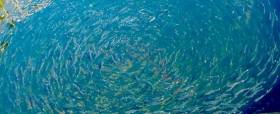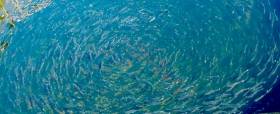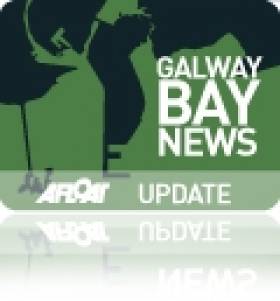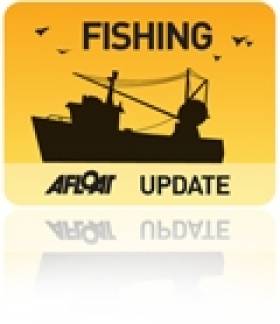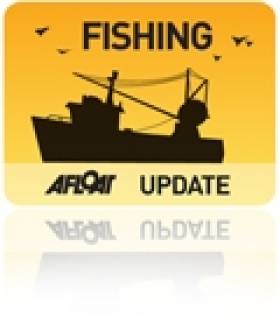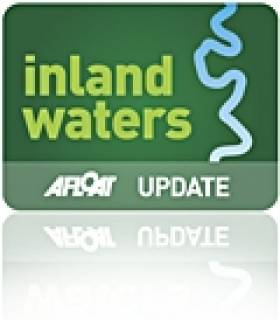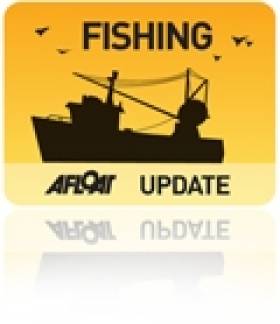Displaying items by tag: fish farm
#FishFarm - Inland Fisheries Ireland has written to stakeholders affected by its recently announced phase-out of fish farming operations that its farms will operate as normal for 2016.
As previously reported on Afloat.ie, the IFI board made the decision to cease fish farming in order to concentrate on its core remit of conservation, protection and development.
Operations in Roscrea, Co Tipperary; Cullion in Mullingar, Co Westmeath; Lough Allua in West Cork; and Cong, Co Mayo are affected by the cessation plan.
But IFI has moved to assure stakeholders that a consultation process will take place to develop the plan.
IFI intends to maintain a single facility for research and stocking purposes, most likely with an modernised hatchery at Cong due to the quality and quantity of local waters.
Inland Fisheries Ireland (IFI) has announced its intention to phase out its fish farming operations over the coming years. A plan will now be developed to implement this decision.
The IFI Board, having reviewed the fish farm operations from both the technical and resource allocation perspectives, has chosen this course of action to ensure that IFI can deliver on its core remit of conservation, protection and development.
IFI management met with the small number of staff who are directly involved in fish farming operations last week to inform them of the decision and has given assurances that there will be no compulsory redundancies as a result of this move and that their employment with IFI will continue.
Dr Ciaran Byrne, CEO of Inland Fisheries Ireland, said: “IFI has performed a technical and financial review of its fish farming operations. Reduced resources within the organisation do not allow for the continuation of these aquaculture activities in the medium to long-term. The Board has no alternative but to phase out this element of its work and concentrate on the conservation, protection and development of Ireland’s inland fisheries and sea angling resources.
“IFI appreciates that many state and club waters have been stocked from IFI fish farms over many decades. We acknowledge the support of IFI’s customers and regret the organisation is unable to continue supporting fish stocking in this manner. The phase out plan will include consultation with affected stakeholders.”
Galway Bay Fish Farm Plans Withdrawn
#FishFarm - Bord Iascaigh Mhara (BIM) has withdrawn the application for its controversial fish farm proposal for the Aran Islands ahead of new plans to limit the size of aquaculture projects.
As the Irish Examiner reports, campaigners against the ambitious 500-hectare, 15,000 tonne organic salmon farm for Galway Bay have welcomed the decision by BIM to rethink its development in line with a new national strategic plan that will limit fish farms to under 7,000 tonnes.
BIM's application has been with the Department of the Marine for more than three years, with Marine Minister Simon Coveney saying this past March that he would not be drawn on any timeframe for a decision to approve what would have been the largest such fish farm in Europe.
The application has long faced opposition from local angling and environmental groups, as well as concerns from the EU over its environmental impact.
This past summer controversy arose again as campaigners blasted BIM for spending thousands of euro on PR on the project, that would have seen Ireland attempt to overtake Scotland as a leading producer of organic salmon.
The Irish Examiner has more on the story HERE.
Connemara Fish Farms Need Freshwater Source
#FishFarm - Long-term solutions for freshwater treatment at Connemara fish farms are a priority as one local company seeks planning permission for a new pipeline, according to Galway Bay FM.
The moves come in the wake of recent controversy over illegal extraction of freshwater from lakes used to treat amoebic gill disease in salmon farms.
Údarás na Gaeltachta is now investigating longer-term freshwater availability for the growing aquaculture industry in south Connemara. Galway Bay FM has more HERE.
Council Warns Connemara Salmon Farms Over Illegal Freshwater Extraction
#FishFarm - Connemara's salmon farming industry has vowed to ensure it abides by all statutory regulations following the recent discovery of illegal freshwater extraction in the Kilkieran Bay area.
As Galway Bay FM reports, Galway County Council has been moved to write to the region's biggest salmon farming companies over their use of freshwater for disease control in their salmon farms.
This was prompted by the discovery of an illegal pumping system at Loch An Mhuilinn, similar to the unauthorised pipeline from Loughaunore that got Marine Harvest Ireland into trouble with the authorities last year.
Marine Harvest, along with the region's biggest producer Bradán Beo Teo, was sent a warning letter by the council in the wake of the latest find, for which it is not yet known who is responsible. The Connacht Tribune has more on the story HERE.
Galway Bay 'Fish Dump' Investigated
#GalwayBay - Dead fish allegedly dumped off Spiddal beach on Galway Bay recently are the subject of an investigation by fisheries protection officials, as The Irish Times reports.
Local campaigners against the proposed salmon farm off the Aran Islands said last week's discovery comprised carcasses of farmed salmon - claiming a tag with the Marine Harvest Island label was found on one of the fish.
Galway Bay Against Salmon Cages also expressed its fears that the fish dump could have "infected" Galway Bay's migrating wild salmon with viruses associated with fish farms.
However, Marine Harvest – which last year was in the news over a controversial freshwater pipeline to treat a disease outbreak at a farm in Kilkieran Bay – said it had no involvement in the alleged fish dump, and no reports of viruses at its aquaculture sites.
The Irish Times has more on the story HERE.
Campaign Against Galway Bay Fish Farm Blasts PR Spend
#FishFarm - Bórd Iascaigh Mhara (BIM) has been blasted by campaigners against its proposed Galway Bay salmon farm for spending tens of thousands of euro on PR for the controversial project.
According to the Connacht Tribune, Galway Bay Against Salmon Cages described as "worrying" the more than €57,000 paid to PR firm Keating & Associates for "communications service", just one of various spends on private consultants totalling more than half a million euro.
The group also expressed concern over letter sent on behalf of BIM to the editors of national newspapers, citing them as an effort to "stifle debate".
However, BIM says the letters were issued "in order to address the publication of inaccuracies regarding BIM and the Galway Bay application".
It also defended the expenditure on consultants as normal operating costs, claiming it regularly hires outside expertise when needed.
Local groups opposed to the 500-hectare salmon farm off the Aran Islands – which would be largest aquaculture project of its kind in Europe – continue to wait for Marine Minister Simon Coveney to make a decision on BIM's licence application, which was originally promised before this summer.
The Connacht Tribune has more on the story HERE.
#Fishing - Marine Minister Simon Coveney won't be drawn on any timeframe for his decision on the controversial Galway Bay salmon farm proposals, according to the Connacht Tribune.
As previously reported on Afloat.ie, the minister said last month that a decision would be made one way or the other before summer, while expressing that he was "cautious" about the fish farming industry.
But he would not be pressed for a specific date despite repeated prompts in the Dáil last week from former minister Eamon Ó Cuiv.
“I have put those who are considering this application under some pressure to try to get those recommendations onto my desk," said Minister Coveney, "but I am far more concerned about getting the decision right than I am about getting a decision made quickly on an application of that size and scale."
The minister also made reference to his approval of shellfish aquaculture schemes - with 278 decisions made since he took office – while he has not approved any new fish farming schemes in spite of a growing backlog of applications.
“When we get a system working, which we now have for shellfish, I will make decisions as soon as I have a scientific, sound basis to do so," he said.
The Connacht Tribune has more on the story HERE.
Fish Farming Company Fined for Damage to Salmonid River
#fishfarm – At a sitting of Clifden District Court on Thursday, 26th of February, Judge Mary Fahy convicted a fish farm company under Section 173 of the Fisheries Act, 1959, for damage caused to the bed of a river in Co. Galway, according to Inland Fisheries Ireland (IFI).
Mannin Bay Salmon Company was before the court, arising from an incident which occurred in July 2014. The court heard that Fisheries Officers had found the company had constructed a dam across the Bunowen River, which flows into Killary Harbour, in order to pump freshwater to a fish farm cage located offshore. Significant damage was caused to the bed of the river, which is a spawning and nursery habitat, and the dam was impeding the passage of fish.
The company pleaded guilty to the charge, and the solicitor for the defence, Mr Thomas Mannion, pleaded that the company had experienced an emergency situation whereby an outbreak of Amoebic Gill Disease threatened the stock of fish on the fish farm. Amoebic Gill Disease can be treated by bathing fish in freshwater for a number of hours. The defence acknowledged that the company knew it should not have dammed the river, but did so in order to avoid significant financial losses.
Convicting the company, Judge Fahy commented that protection of fish habitat was very important, but acknowledged that the company had been co-operative and had removed the dam and rectified the situation immediately once Fisheries Officers became aware of it. She fined the company €500, with €500 costs.
IFI has a confidential hotline number to enable members of the general public to report incidents - 1890 34 74 24 or 1890 FISH 24. This phone line is designed to encourage the reporting of incidents of illegal fishing, water pollution and invasive species.
Decision 'Before Summer' On Galway Bay Fish Farm Says Minister
#FishFarm - Marine Minister Simon Coveney says a decision on the Galway Bay fish farm will be made before the summer, as TheJournal.ie reports.
Speaking on RTÉ Radio 1's Countrywide on Saturday 7 February, the minister said he is "cautious" about the fish farming industry, noting that he has not approved any aquaculture projects since taking his cabinet post in 2011.
The Galway Bay salmon farm project, first applied for by Bord Iascaigh Mhara in 2012, has been especially contentious with local angling and environmental campaigners.
In recent days this controversy has flared up again with BIM being accused of silence over commercial interest in running what would be the biggest organic salmon farm in Europe should it be given the go-ahead.
However, Minister Coveney did say that there is "room for the industry to grow" and that his department has introduced a "very robust" and "environmentally responsible" licensing regime for future projects.
The minister's comments can be heard on the RTÉ Radio 1 website HERE (also available to download as a podcast).



























